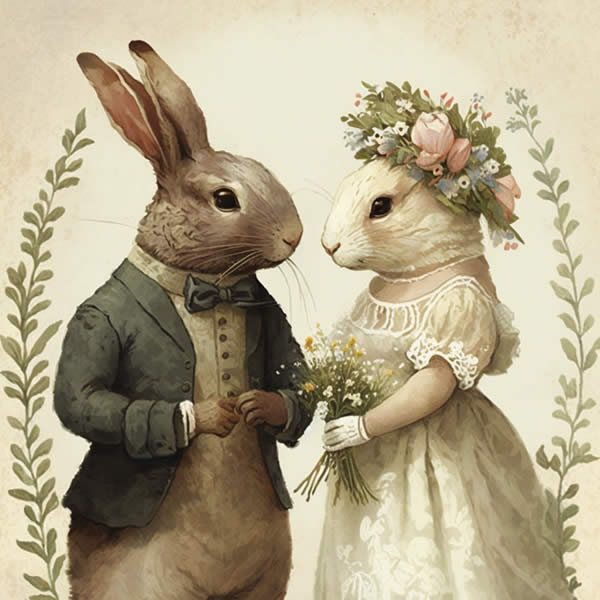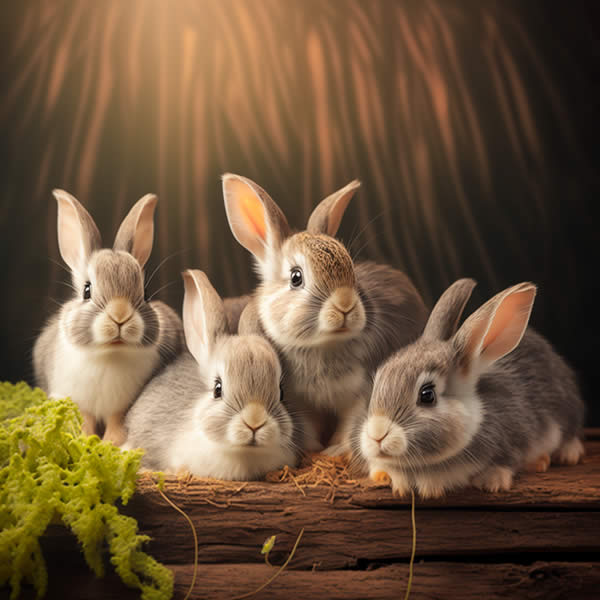Do Rabbits Mate For Life?
Are rabbits monogamous or do they move on when the “bunnymoon” is over? It’s a question that has been on many people’s minds, including mine. In the hope of getting to the bottom of this age-old query, I decided to look into it deeper and find out if rabbits mate for life.
Table of Contents
- So, What’s the Dirt?
- Do Male Rabbits Kill Their Offspring?
- How Long Do Rabbit Relationships Last?
- Do Rabbits Bond and Form Friendships?
- Do Rabbit’s Grieve When Their Mate Dies?
- When Do Rabbits Start Breeding?
- How Long Do Rabbits Last When Mating and How Long is Mating Season?
- What Age Do Rabbits Stop Breeding?
- What We’ve Learned About Rabbit Mating
So, What’s the Dirt?

Turns out, rabbits don’t mate for life. Their polygamous behavior means that after the initial bunnymoon, the male rabbit (or “buck”) moves on in search of new partners, leaving the female rabbit (called a “doe”) and any baby rabbits, or “kittens” as they’re called, behind.
That being said, with wild rabbits if given enough space and freedom to interact with different partners, a number of female rabbits can sometimes stick together and share a burrow while breeding with several males in a loose family group. They also tend to have their own territories which can overlap each other occasionally, meaning that one rabbit will breed with multiple mates over its lifetime – but never one single partner.
This means that not only will multiple males be needed for successful breeding – but those multiple partners should also all be from different gene pools in order to guarantee healthy offspring as much as possible. It’s not just important for health reasons either – non-related partners are essential because otherwise it’s likely that any offspring produced won’t have strong enough immune systems to survive predation by disease-carrying parasites.
Do Male Rabbits Kill Their Offspring?
Are you curious to know if male rabbits kill baby rabbits? It’s a peculiar question, but one with an interesting answer. Male rabbits, also called bucks, have all too often been observed killing their own offspring. This patricide is commonly seen in domesticated and wild bunnies alike.
One explanation for this behavior is that the buck may recognize its own rarely seen in newborn kittens. With no social interaction and no familiarity of the parents, it can be difficult to establish trust between family members. Thus, the buck rabbit will act upon instinct and attempt to eliminate the risk of competition by killing its own young.
Not all occasions of this violent action involve aggression from the buck rabbit though; some cases are from lack of breeding experience or physical exhaustion during mating season when females are overly active in searching for mates and neglecting parenting duties. Whatever the case may be, it is important for us to become more aware of rabbit mating behaviour so that we can better understand what makes them tick!
How Long Do Rabbit Relationships Last?
We’ve answered “do rabbits mate for life” but a lot of people may still wonder though – how long does the relationship between male and female rabbits last? Well generally speaking the answer is just hours, so if you’re looking for romance between your pet rabbits, you might want to keep searching!
That said, once two rabbits do successfully mate then they can often stick around each other’s immediate vicinity until new mating opportunities present themselves elsewhere.
While rabbits aren’t typically creatures known for mating for life and are quite promiscuous animals – they do form some level of affection during reproduction season under certain circumstances; however, this tends to dissipate quickly when mating season is over or when new potential partners arrive at their burrow area.
Do Rabbits Bond and Form Friendships?
Rabbits are fascinating animals that many of us keep as pets, and a big part of what can make them such great companions is their capacity to bond with other rabbits and even humans. But do rabbits actually bond or is it just a myth? We’ve done some research and have the answer you’ve been looking for.
It’s true that rabbits don’t mate for life like other animals do, however, they do form strong connections between themselves and those around them. Rabbits’ mating rituals involve a significant amount of bonding to ensure successful reproduction. Rabbits will also go through periods of grieving if another rabbit dies or goes missing, showing that their connections run deep.
So yes, rabbits do have the ability to form lasting bonds with each other and even with people! Pet owners should be especially mindful when introducing two new domesticated rabbits together so as not to cause any discomfort to either bunny. With the right environment, patience and understanding, you can help your pet rabbits build a strong bond over time. Just be sure to provide plenty of playtime and treats along the way!
Do Rabbit’s Grieve When Their Mate Dies?
The relationship between a bonded pair of domestic rabbits is a beautiful thing to observe. A rabbit’s mate may be with them for many years, and when their mate dies, do rabbits grieve? This is an important question to ask for those who have pet rabbits or those considering getting into rabbit breeding. It’s possible that rabbits experience emotions similarly to how human beings do, including feelings of grief.
Rabbits are highly social animals and form strong bonds with both other rabbits and humans over time. It makes sense that if one of these relationships were to end suddenly, the surviving bunny might feel a sense of loss.
Moreover, grieving isn’t limited to just feeling sadness or loneliness either – it can also manifest itself in different behaviors such as becoming lethargic, or refusing food. In some cases, even actively searching for their lost partner has been observed in a few instances as well. Despite not being able to prove it conclusively, there is a possibility that a pet rabbit can feel grief after losing its mate due to the deep bond shared between them.
Though we may never know exactly what goes on inside our beloved bunnies’ heads when faced with the death of their mates, we can still try our best to help them cope with their grief by providing extra love and attention during this difficult time. Whether you’ve had your pet for just two days or ten years – showing your compassion and understanding can truly mean the world for these gentle creatures during this particularly challenging period in their lives.
Do rabbits grieve when their mate dies? The answer is yes – though it’s hard to assess exactly how strongly they are affected by their departed friend’s passing away without being able to communicate directly with them, there’s no doubt that they do feel a deep connection which might cause them to go through periods of mourning like any other species would too.
When Do Rabbits Start Breeding?
It’s an important question when it comes to caring for your pet rabbits. Rabbits typically reach sexual maturity anywhere between 4 and 8 months of age, depending on the breed, size and gender of the rabbit. Females tend to mature faster than males, so if you plan on having baby bunnies in the near future it’s best to optimize the conditions for them prior that time frame. This means providing them with a suitable environment, plenty of food, plenty of exercise and lots of love!
How Long Do Rabbits Last When Mating and How Long is Mating Season?

When considering whether or not it’s time for your rabbit to begin mating, remember that genetics, nutrition and health play a large role in determining successful breeding outcomes. Make sure both of your rabbits have been checked out by a vet for any potential genetic issues or health conditions before you start planning for any new arrivals to join your bunny family!
Mating season for both the domestic and wild rabbit is an exciting time of year as it denotes the start of new life that will take root in the world. When rabbits breed it’s actually quite a quick affair – much faster than most people might imagine or expect. It is said that typically they take between 20 seconds and one minute to complete their “duties” as buck and doe. Although, this timing can vary depending on numerous factors like whether either of them has mated before or if they are particularly eager with their courtship behavior!
But underneath its shallow surface lies more complexity. After mating, does remain fertile for around 28 days, making it possible for her to become pregnant multiple times throughout mating season if she finds suitable partners each time around. Additionally, buck rabbits may stay fertile for up to 4-5 months at a given time depending on their health status and other environmental conditions. So while they may not be mating during that whole period, bucks may still potentially be able to fertilize several litters throughout the entire season!
What Age Do Rabbits Stop Breeding?
While this varies from species to species and from individual animal, it’s generally accepted that a buck (male) rabbit will continue to mate until late adulthood. This is usually about 4-5 years old. While a doe will start to become less fertile around 3-4 years of age. If you plan to breed rabbits, it’s important to understand the basics before beginning your journey!
Breeding rabbits is an incredibly rewarding experience but it requires dedication and responsibility. You must consider things like nutrition requirements and proper housing arrangements when planning on bringing new bunnies into the world. There’s no room for winging it here! Make sure you research thoroughly beforehand as this will help ensure that both bucks and does remain in good health during their prime breeding ages. Knowing what age rabbits stop breeding should be just one piece of information that helps inform your decision.
What We’ve Learned About Rabbit Mating
Do rabbits mate for life? No, rabbits are polygamous and do not mate for life. Often, wild rabbits mate with the nearest rabbit, and only mate with the same rabbit if there is little choice. Monogamous rabbits are virtually unheard of unless rabbit owners keep a pair of mating partners together.
That said, domestic rabbits can bond and form friendships. Wild rabbits tend not to form strong relationship with each other. We’ve also learned that rabbits mate between the ages of 4 to 6 months until they reach the age of 4 to 5 years old. Rabbits are social creatures and prolific breeders for almost their entire lives. So, unless a pet rabbit owner wishes to have many furry friends it’s best to keep a male rabbit and female rabbit apart.
